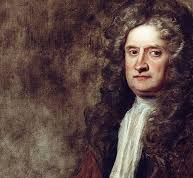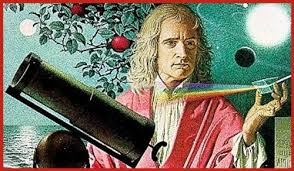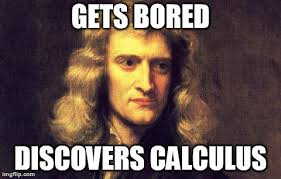 |
| Isaac Newton (Online (Unknown)) |
Isaac Newton is a man who most know as the person who came up with the force known as gravity and what it does, but the truth is unfathomably more complicated than him sitting under a tree and getting hit in the head by a falling apple. He came up with The Laws of Motion and Gravity and many other shocking scientifically advanced ideas. At a young age of 12, Isaac Newton reunited with his mom, who remarried after Isaac's father passed away when he was a baby. His mother wanted Isaac to become a farmer like his father, but Isaac found it redundant and boring. His true passion lied with science or anything related to the subject. He came up with extraordinary ideas about the universe for his time such as The Laws of Gravity and Motion. Most of Isaac's discoveries are the basics of some subcategories of modern science. A hero is someone who wants to help others, whether it be a mere few or an entire populace and in Isaac Newton's case, he wanted to improve the scientific world of his time to be more advanced and maybe solve common problems with it.
 |
| Isaac Newton (Online (Unknown)) |
Isaac Newton was a stubborn scientist when it came to being critiqued on his works and ideas about science. With that said, he didn't expect to be famous, but only wanted to improve the world of science for others of his time. Newton never knew his ideas would change science as people knew it forever, even today, scientists around the world know his name as the man who revolutionized physics. Isaac Newton had many rival scientists in his time, and some who were smarter than Newton. Yet Isaac still came up with brilliant ideas and inventions as well as make a lot of personal accomplishments: "As a firm opponent of the attempt by King James II to make the universities into Catholic institutions, Newton was elected Member of Parliament for the University of Cambridge to the Convention Parliament of 1689, and sat again in 1701-1702. Meanwhile, in 1696 he moved to London as Warden of the Royal Mint. He became Master of the Mint in 1699, an office he retained to his death. He was elected a Fellow of the Royal Society of London in 1671, and in 1703 he became President, being annually re-elected for the rest of his life. His major work, Optics, appeared the next year; he was knighted in Cambridge in 1705," (Isaac Newton's Life). The section of the introduction can show that Isaac was a very passionate individual and stood by his beliefs. At this time period, many people in Isaac Newton's living region found Catholic Institution redundant from Universities, so they didn't like the idea of turning Universities into Catholic Institutions. He stood his ground and didn't let King James II make the University a Catholic Institution along with many others who disapproved of the idea. Isaac Newton was a very talented and intelligent individual for his era. He studied subjects such as: optics, mathematics, physics, and astronomy to learn more about science and how it applies to the world around him: "In 1665 Newton took his bachelor's degree at Cambridge without honors or distinction. Since the university closed for the next two years because of plague, Newton returned to Woolsthorpe in mid year," (Isaac Newton 1643-1727). In the section from the biography of Isaac Newton from BBC, readers learn why Newton was like the godfather of physics and how he came up with all the ideas for gravity, motion, the light's movement, and a lot of others topics that have become important in modern science. Newton studied many subjects that later, in his adult life, helped Isaac Newton be the scientist that the modern world knows today. Isaac Newton's childhood was one of tragedy, but he managed to pull out from the negative rubble that was on top of him and become one of the smartest minds in his time.
Isaac Newton didn't help his mom tend to their father's farm, but he used his education to help the science community and the brilliant people in it. Hooke talks about the fact that when a body is going in one direction, only an equal or opposite force can stop it: "Correspondence with Hooke (1679-1680) redirected Newton to the problem of the path of a body subjected to a centrally directed force that varies as the inverse square of the distance; he determined it to be an ellipse, so informing Edmond Halley in August 1684. Halley's interest led Newton to demonstrate the relationship afresh, to compose a brief tract on mechanics, and finally to write the Principia," (Isaac Newton's Life). In this portion of Isaac Newton's life, Isaac is talking to Hooke about, what would be known as the Law of Motion, and how it is different for everyone because no one is the same. Hooke and Isaac also talk about an infinite force that is everywhere in the universe around them and how it pushes objects downward. This force would later be called gravity by Isaac Newton. Newton did many experiments in the subject of optics, which is the behavior of light. This became what inspired the modern study of optics: "From the mid-1660s, Newton conducted a series of experiments on the composition of light, discovering that white light is composed of the same system of colours that can be seen in a rainbow and establishing the modern study of optics (or the behavior of light)," (Isaac Newton 1643-1727). Isaac Newton studied optics and conducted many experiments to find out the behavior of light which later developed into the modern study of optics. Newton studied many subjects, including optics and made many advances in the way people understood light and how it works. Even as a young teenager, Isaac Newton loved science and wanted to improve upon it. His mom pushed him to become a farmer and tend to the fields but Isaac refused the boring lifestyle and traded it for a life of advances and improvements.
 |
| Isaac Newton (Meme) (Online (Unknown)) |
Isaac Newton was a teenager when he started thinking about complex ideas about the world and the mysteries in it. He was a genius as an adult and always tried to do the best he could to improve science and how others understood it. He made the Laws of Motion, the term known as Gravity, he showed people how light works and behaves using optics, and so much more. That is why Isaac Newton is an inspiration and a hero. Isaac Newton was credited to being one of the many great minds of the 17th century in England and he proved it by being a gifted physicist and mathematician who developed a book about natural philosophies (Philosophiae Naturalis Principia Mathematica): "Born on January 4, 1643, in Woolsthorpe, England, IsaacNewton was an established physicist and mathematician, and is credited as one of the great minds of the 17th century Scientific Revolution. With discoveries in optics, motion and mathematics, Newton developed the principles of modern physics. In 1687, he published his most acclaimed work, Philosophiae Naturalis Principia Mathematica(Mathematical Principles of Natural Philosophy), which has been called the single most influential book on physics. Newton died in London on March 31, 1727," (Isaac Newton). Isaac was a brilliant scientist who only wanted to help others better understand the fundamentals of their universe and the science involved in shaping it. He was a great philosopher and was known as one of the smartest minds of the 17th century. Isaac did experiments that approved his theories about the universe around him and he shared this with scientists in England to form a consensus about it and that is how people in the modern age know what gravity is and why there are rainbows after a rainy day. Isaac Newton was a brilliant man, even as a young teenager he had many thoughts in his mind that he would later delve into more detail as he researched the topics: "In 1665 Newton took his bachelor's degree at Cambridge without honors or distinction. Since the university was closed for the next two years because of plague, Newton returned to Woolsthorpe in midyear. There, in the following 18 months, he made a series of original contributions to science. As he later recalled, 'All this was in the two plague years of 1665 and 1666, for in those days I was in my prime of age for invention, and minded mathematics and philosophy more than at any time since.' In mathematics Newton conceived his 'method of fluxions' (infinitesimal calculus), laid the foundations for his theory of light and color, and achieved significant insight into the problem of planetary motion, insights that eventually led to the publication of his Principia (1687)," (Isaac Newton Biography). Newton was a brilliant scientist, even as a young teen Isaac Newton had thoughts about how the world works and what variables contribute to that ideal. As an adult, he came up with his "method of fluxions" which is now known as "infinitesimal calculus". In the modern world, it is easy to forget how people like Isaac newton contributed to the first moon landing, subjects like calculus and trig, the mere word known as gravity, and so much more scientific advancements in the world people live in. Isaac Newton is a true hero.
WORKS CITED "Isaac Newton." Bio. A&E Television Networks, 2015. Web. 24 Mar. 2015. "Isaac Newton (1643-1727)." BBC News. BBC, n.d. Web. 17 Mar. 2015. "Isaac Newton's Life." Isaac Newton's Life. N.p., n.d. Web. 27 Mar. 2015. Hatch, Robert A., Dr. "Isaac Newton Biography." Isaac Newton Biography - Newton's Life, Career,
Page created on 4/16/2015 12:00:00 AM
Last edited 4/16/2015 12:00:00 AM
